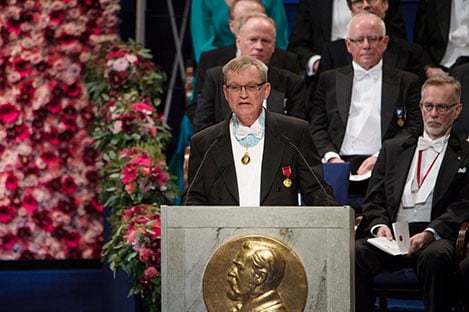Speech by Professor Carl-Henrik Heldin, Chairman of the Board of the Nobel Foundation, 10 December 2016.

Professor Carl-Henrik Heldin delivering the opening address during the Nobel Prize Award Ceremony at the Stockholm Concert Hall.
Copyright © Nobel Media AB 2016
Photo: Pi Frisk
Your Majesties, Your Royal Highnesses, Esteemed Nobel Laureates, Ladies and Gentlemen,
On behalf of the Nobel Foundation, it is a great pleasure for me to welcome you all to this year’s Nobel Prize Award Ceremony, which is held to honour the Laureates for their outstanding contributions to science and literature. In particular, I would like to wish the Nobel Laureates and their families welcome to this ceremony.
Earlier today, in Oslo, President Juan Manuel Santos received the Nobel Peace Prize for his resolute efforts to bring the more than 50-year-long civil war in Colombia to an end.
We are gathered here today to honour science, humanism and peaceful coexistence. We are here as individuals, not as representatives of states, groups or interests. In 1895, Alfred Nobel wrote in his will that no consideration should be given to nationality – that the most worthy should receive the Prize. Nobel himself was born in Sweden but worked abroad for much of his life: in St. Petersburg, Paris and San Remo. He spoke five languages and worked with people from different cultures and with different religious backgrounds. Nobel was a true cosmopolitan, convinced of the value of extensive cross-border contacts.
Alfred Nobel was also influenced by the New Enlightenment, a period during the late 19th century when new political ideas emerged. There was strong optimism which was manifested in recurring world exhibitions, spectacular structures like the Eiffel Tower and arenas for peaceful international competitions such as the Olympic Games. It was also an era of rapid economic expansion, with millions of people being rescued from poverty thanks to industrialisation and entrepreneurship.
Meanwhile it was an era that was strongly shaped by nationalism, xenophobia and military threats − developments that would culminate in the horrendous First World War.
Much of what was topical for Alfred Nobel in the late 19th century also characterises the world of today. Billions of people have been lifted out of poverty by globalisation and international trade. Many people around the world are addressing the major challenges facing humanity. Researchers are making fantastic scientific discoveries. Authors and poets are writing about difficult existential issues. And dedicated leaders are making efforts to achieve peace. These are contributions we are rewarding today with the Nobel Prize.
But just as in the era of Alfred Nobel, today there are dark clouds in the sky around the world. Terrorist acts are a part of many people’s daily lives, and wars are under way in many places. International cooperation, cross-border movements and openness are being criticised. Science and knowledge are being questioned, the climate issue being one recent example.
Leading politicians − both in Europe and the United States – are winning votes by denying knowledge and scientific truths. Populism is widespread and is reaping major political successes.
The grim truth is that we can no longer take it for granted that people believe in science, facts and knowledge.
In times like these, the Nobel Prize is important. Alfred Nobel wanted to reward those who have conferred the greatest benefit to mankind. He understood the power of example, and this is a central concept behind his will. Good role models show by their words and deeds that it is possible to understand the world and to improve it. They confirm that people can tackle the biggest challenges of our era. Doing so requires creative and courageous individuals who are willing to take the lead, find solutions and broaden our awareness.
Alfred Nobel wanted the Nobel Prize to contribute to a better world, and he wanted us to be inspired by the Nobel Laureates and what they have achieved for humanity.
This is why we have developed public activities over the past 20 years that are based on all this accumulated knowledge, and which should inspire learning, reflection and questioning. During the days when the 2016 Laureates were being announced, 100 million people engaged with us through our digital channels. There is an enormous interest in learning about the scientific and humanistic advances that are rewarded with the Nobel Prize.
In light of this, we are pleased that a new Nobel Center – the Nobel Prize’s own building − is about to take shape here in Stockholm. The Nobel Center will be a place where the fascinating stories of the Nobel Laureates and their discoveries will be at display. It will also be a global platform with education, knowledge and critical thinking at its heart, where the major challenges of tomorrow will be discussed.
Albert Camus, who received the 1957 Nobel Prize in Literature, said that “The seventeenth century was the century of mathematics, the eighteenth that of the physical sciences and the nineteenth that of biology. Our twentieth century is the century of fear.”
The twenty-first century has begun with a growing sense of fear, and there is concern that conflicts will characterise this century as well. But such a development is not predestined. It is our task to influence how our era will be described, and there are good reasons to be hopeful. We see a growing interest among young people in seeking knowledge. And we see an ever-increasing engagement in tackling major global challenges.
This is where the Nobel Prize has an important task – to serve as a source of inspiration for people who want to build a better world.
This is the truly amazing legacy left by Alfred Nobel, 120 years after his death.
Your Majesties, Your Royal Highnesses, Esteemed Nobel Laureates, Ladies and Gentlemen: Thank you for listening and once again, most welcome to this year’s Nobel Prize Award Ceremony.
Copyright © The Nobel Foundation 2016